Fatimatu Abubakar, the former Minister of Information, has ignited a controversy by asserting that the National Democratic Congress (NDC), despite holding a majority in Parliament, appears less influential due to the perceived inability of many of its members to articulate themselves effectively in English. This alleged linguistic deficiency, according to Abubakar, contrasts sharply with the fluency of their New Patriotic Party (NPP) counterparts, who, despite being numerically fewer, dominate parliamentary discourse. Abubakar’s comments, made during an interview on a pro-NPP television station, suggest that this supposed language barrier hinders the NDC MPs’ effective participation in parliamentary proceedings, especially within committees. Her claims have been met with mixed reactions, sparking debate on the role of language proficiency in political representation and the fairness of such assessments.
Abubakar’s argument hinges on the observation that fewer NDC MPs participate actively in parliamentary debates, attributing this to their struggles with the English language. She claims to have received feedback suggesting that the NPP appears more effective in Parliament, despite being the minority party, due to this perceived difference in communication skills. This, she posits, has led to frustration among NDC supporters who witness their representatives seemingly sidelined in discussions. Abubakar highlights the alleged struggles of NDC MPs on various parliamentary committees, painting a picture of representatives unable to contribute effectively due to language barriers. She further claims that some prominent NDC figures have been relegated to less influential positions, ostensibly due to their lack of fluency in English.
The backdrop of this controversy is the shift in parliamentary power dynamics following the 2024 general elections. Before the elections, the NPP held a slight majority with 137 seats plus one independent MP. The elections, however, resulted in a significant swing, leaving the NPP with around 88 seats and granting the NDC a commanding majority of over 180 seats – the largest in Ghana’s Fourth Republic. This dramatic shift in parliamentary representation has intensified the scrutiny on the performance of both parties, making Abubakar’s comments particularly provocative. The NDC’s substantial majority, coupled with the alleged communication challenges, has created a narrative of underperformance, at least according to Abubakar’s perspective.
Abubakar’s comments raise several crucial questions about the role of language in political representation. While English is the official language of parliamentary proceedings in Ghana, the country boasts a diverse linguistic landscape. The emphasis on English proficiency, therefore, raises concerns about the inclusion and effective representation of constituents whose primary language is not English. It also begs the question of whether focusing solely on English speaking abilities overshadows other crucial qualities of effective representation, such as understanding of policy, commitment to constituents, and legislative skills. Furthermore, Abubakar’s comments could be interpreted as undermining the legitimacy of the NDC’s majority, implying that numerical superiority is less significant than fluency in English.
It’s important to acknowledge the potential complexities and nuances of this issue. While Abubakar’s comments highlight the importance of effective communication in parliamentary proceedings, it is crucial to avoid generalizations and stereotypes. Judging the effectiveness of MPs solely based on their English fluency overlooks other important factors that contribute to their performance. Moreover, such assessments can be perceived as elitist and dismissive of the diverse linguistic backgrounds of both the representatives and their constituents. A balanced perspective requires considering the broader context of representation and the various ways in which MPs can effectively advocate for their constituents, regardless of their level of English proficiency.
This controversy underscores the need for a broader discussion on language inclusivity in Ghana’s political landscape. While English serves as the official language of Parliament, exploring ways to accommodate and value other languages could enhance representation and ensure that all citizens feel heard and understood. This might involve providing translation services, encouraging multilingualism among parliamentary staff, and fostering a more inclusive environment that values diverse communication styles. Ultimately, the goal should be to create a Parliament that truly reflects the linguistic diversity of Ghana and empowers all representatives to contribute effectively, regardless of their primary language.














